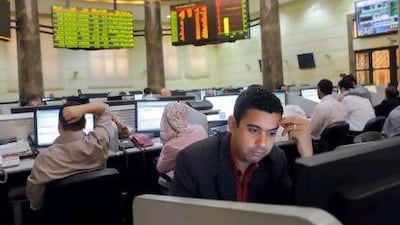Investors will be eyeing cues from Europe this week to assess whether there is enough momentum to sustain global equities' gains.
The interest comes after euro-zone leaders took further steps to resolve the region's debt crisis.
Euro-zone leaders on Friday agreed to allow their rescue fund starting next year to directly recapitalise debt-stricken banks rather than going through governments.
They also approved a mechanism in which they can intervene in bond markets and buy government debt.
Officials also agreed to create a single banking watchdog for the region's lenders, housed under the European Central Bank.
"It looks like a major policy shift for the European Union, especially for Germany, which has been opposed to the idea in the past," said Anastasios Dalgiannakis, the head of trading at Mubasher Financial Services in Dubai.
"I think we will definitely have to see a continuation in an upward movement, especially if measures attached are benign and not very strict. We could see a positive start for the month of July."
The Saudi Tadawul All-Share Index rose 2.1 per cent at the open to 6,724.74 yesterday, tracking the performance of global markets the day before. It closed 1.89 per cent higher at 6,709.91.
In Europe, Germany's DAX jumped 4.3 per cent to 6,416.28 on Friday. The Stoxx 50 Index climbed 4.9 per cent to 2,264.72, while the FTSE 100 Index gained 1.4 per cent to 5,571.15. In the United States, the Dow Jones Industrial Average climbed 2.2 per cent to 12,800.10, while the S&P 500 Index advanced 2.4 per cent to 1362.16, its biggest rally since 1999.
As the second quarter drew to a close, investors in the Arabian Gulf are now positioning ahead of earnings results, expected to be released during Ramadan.
The Abu Dhabi Securities Exchange General Index declined 2.4 per cent to 2,447.62 last week, while the Dubai Financial Market General Index fell 1.2 per cent to 1,451.87.
"It has been a headline-driven market but this will all eventually go back to the fundamental of companies," said Fadi Al Said, a senior fund manager at ING Investment Management in Dubai.
Egypt's stock-market will be the key focus this week, after the Moslim Brotherhood's Mohammed Morsi became the first democratically elected president, triggering a euphoric rally for local shares.
Investors will be looking for cues from Mr Morsi on how the country's government plans to tackle the political and economic challenges ahead.
"Clearly there was a knee-jerk reaction after the presidential results but now the real work begins, with the IMF loan still in limbo and other pledges on hold," said Julian Bruce, EFG Hermes' director of institutional equity sales in Dubai.
"We will probably see some consolidation and gains on selected gains but for significant allocations, we still have to wait until things pan out and become clearer and better."
Egypt's EGX 30 Index rose more than 11 per cent in the days following the announcement that Mr Morsi was Egypt's president following the revolution that ousted Hosni Mubarak.
The market had declined about 10 per cent in the past two months on fears of violence and as the ruling military council clamped down on protestors while limiting the president's powers only days before Mr Morsi's victory.
Sworn in yesterday, the new president said he was "still looking" at the possibility of securing a much-needed US$3.2 billion (Dh11.75bn) loan facility from the IMF, Bloomberg reported.
Foreign investors are likely to remain on the sidelines until Egypt for now, analysts said.
"There is a lot of value in Egyptian companies but that won't be realised until stability comes back,' said Mohammed Ali Yasin, the managing director of Abu Dhabi Financial Services, the brokerage arm of National Bank of Abu Dhabi.
"It has been a highly volatile but positive year for the Egyptian stock market, in spite of all the turmoil. People in general really want to move forward, if that happens, regional players will come back to Egypt stocks."
twitter: Follow and share our breaking business news. Follow us
iPad users can follow our twitterfeed via Flipboard - just search for Ind_Insights on the app.

